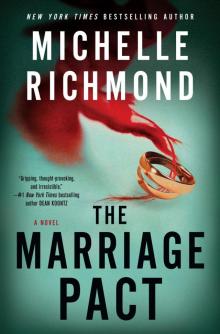- Home
- Michelle Richmond
Golden State Page 15
Golden State Read online
Page 15
“My unit was stationed at an FOB just outside of town, doing security for a reconstruction team and training the local police, when my commanding officer told me that we were going to have a visit from a very important person.”
The potted plant that she had brought as a hostess gift sat on the table between us. I sipped my wine. I didn’t believe her, but I was still intrigued by the story, eager to see how she would get herself out of the hole she had dug. “I see.”
“You can look it up,” she said, defiantly spearing a broccoli floret from the appetizer tray. “I’m sure there must have been articles in the paper about his trip.”
How long had she been working on this fairy tale? Had she rehearsed it again and again, gearing up for the day when she would present it to me, or was she making it up on the spot? Had she told it to others, or was I getting the first draft? I thought of the stories she’d told me in the past. For as long as I remembered, she had lived in a fantasy world, populated by improbable meetings with celebrities and hairbreadth escapes from death. When she was small, it had been charming: she could tell you with a straight face that she had met Jimmy Carter at the K&B, or that a lion had crossed her path when she was walking home from school. Each tale came with vivid details. When she was small, her stories delighted me, and I, like our mother, took them as a sign of budding talent. “You’ll be a writer one day,” I used to say, but she’d never taken an interest in writing her stories down. I think it was the immediate reaction she enjoyed—the look on someone’s face when she told her lies, the challenge of convincing a person that what she said was true.
As she got older, the stories became milder, as if they had been calculated to be both dramatic and credible. The kind of stories that could have been true, if a person was inclined to believe her. I once heard her tell a new boyfriend about the time she was walking down the street and saw a group of workmen installing a plate-glass window several stories above, and in the next instant the big pane was suddenly in freefall. According to her story, the big pane shattered on the ground just inches behind her, spraying the street with shards but leaving her completely unharmed. “A split-second difference in my pace,” she had told the mesmerized boyfriend, “a moment of hesitation as I walked, and the glass would have taken off my head.” There was also the one about how she met Kevin Bacon while stopped at a red light in Oxford, Mississippi, and he took her out for a burger and fries. “He was the nicest guy in the world.”
Heather lived in a dramatic world of her own making. The most frustrating thing about her stories was that, while I didn’t believe them, there was no way to disprove them. Whenever I expressed doubt, she acted greatly wounded. “What, you don’t think Kevin Bacon would find me interesting?”
I had no more reason to believe her story about the governor than I had to believe any of the others. I knew that if I looked it up, I would probably discover that the governor had visited Kabul on the date she specified. Maybe she had met him, and I could see how, in her professional capacity, she might have had a conversation with him, in which case it was even quite plausible that he had flirted with her. But to create a version of her life in which they were in love and having a baby together—it was just too much. Why had I thought she had changed?
“Anyway,” she continued, “I was assigned to show the governor around camp.”
“So, what was he like?” My psychiatry course in medical school had included a unit on chronic lying. While it’s not considered a mental illness in its own right, it is often grouped as a symptom with those of other mental illnesses—narcissism, delusional thinking. But there are also cases in which otherwise normal individuals leading productive personal and professional lives lie compulsively, with no apparent reason. In some situations, a frontal lobe injury is to blame. I’d read a fascinating study about chronic lying in veterans who had suffered just such injuries. Which might make sense with Heather, were it not for the fact that she’d been lying practically since she could talk.
“He was completely charming,” she said. “But a little nervous. We had politicians coming through all the time. It was a photo op for most of them, and you could tell that while you were talking to them, their mind was somewhere else. With him, it was different. He was really listening. When I walked him around the base, his questions were genuine. He had an assistant, of course, a driver, the usual bodyguards, but he was personally taking notes. The other thing was that he didn’t bring a photographer or camera crew. He had his own little point-and-shoot, but that was it. He was the first politician I’ve seen, and I’ve seen a lot, who didn’t want official pictures of himself at the base.”
“But how did you—”
“End up in the sack together?”
“Well, yes. It’s one thing to show him around the base, but logistically speaking, the other seems almost impossible.”
She looked away, and I realized she hadn’t thought that far ahead in her story. Maybe this was the point where she’d confess that it was all an elaborate lie. But she kept talking.
“He was in the region for ten days. The first day, after I showed him around, he took me aside and asked if he could have dinner with me that night. It didn’t occur to me that he might be asking out of a personal interest. I thought he had some questions he wanted to ask off the record, which, quite frankly, would have put me in a very awkward position. He wrangled permission from my commanding officer for me to leave the base, and I went with his entourage to the Green Zone, riding side by side with him in the Humvee. There were contract soldiers in the front, and vehicles ahead of us and behind us, but in the backseat, it was just the governor and me. We kept bumping into each other as the Humvee plowed over the terrible road. He asked where I was from. I was nervous, so I was just sort of babbling on and on about Mississippi, and when I stopped to take a breath I realized that he was looking at me in a funny way, and it was so odd, it just sort of stopped me in my tracks, and I said, ‘What?’
“He said, ‘You’re really beautiful,’ and I was just sitting there, sort of confused. I mean, guys say shit all the time to get you in bed, it’s what guys do, but this was the governor. It was different.”
“Mmm-hmm,” I said, playing along.
“So we had dinner in his quarters. I have no idea what we ate—it was all so surreal. He told me that he had a project he needed help on. He wanted to draft a document to bring back to the state legislature and to a meeting of governors. Everything he’d seen had confirmed in his mind the need for a surge, and he wanted a solid report to take back to California. I got the feeling he was expecting a lot of political fallout and he wanted some ammunition. I’d written plenty of reports for the PR office, so it really didn’t seem that strange. Of course, I assumed I would be working with one of his aides.
“I spent the night in a room that had been arranged for me in the Rasheed Hotel in the Green Zone. I still remember the shower—it was amazing, having my own shower, all to myself, with plenty of hot water. Anyway, the next day, I was escorted up to a room in his quarters. There was a desk, a few elaborate chairs, an oddly ornate sofa, a chandelier, and a gilded coffee table, which had apparently once belonged to a high-ranking minister. But there was no aide waiting there for me. It was just the governor, in jeans and a University of San Francisco T-shirt. We spent the day together, with a laptop computer and endless cups of coffee, working on this report. He kept asking questions, really wanting my opinion, asking me how I would phrase this or that, whether a paragraph struck the right tone. What impressed me most about him was his intelligence—which is an understatement, really. The guy is brilliant.
“There was a strange energy in the room. Every time our hands brushed against each other I got all flustered, like I was in junior high. But I just kept thinking, (A) it’s the governor, there’s no way a man like that would be interested in me, and (B) even if he is interested, it would be a very bad idea on my part, because he doesn’t have the best track record.”
As Heather
talked, I found myself getting wrapped up in the story—leaning forward, listening intently, wanting to know what happened next. And then I had to remind myself that I’d fallen through this rabbit hole before—that I’d become completely invested in something she was telling me, only to realize, because of some inconsistency, some blip in the screen of her story, that she’d made it all up. I noticed that, as she was speaking, she rarely met my eyes.
“So it goes for three days. Me and the governor alone in this hotel room, with Blackwater standing guard outside. We’re occasionally interrupted by a member of his staff or by someone bringing us food and coffee, but for the most part, it’s just the two of us. And on the fourth day, we’re forty-six single-spaced pages into this monster of a report we’re writing, and he leans over and kisses me. And that’s that. We didn’t get any work done for the rest of the day, or the day after that, but I kept coming back to his quarters on the pretense of writing the report, which we did eventually get back to. We ended up talking about a lot of other stuff too—our childhoods, his career, his separation from his wife, all the ways I’d fucked up. I didn’t leave anything out, and neither did he. He laid everything on the table, and I knew I had to do the same. By the time he left the country, it was a full-blown thing. I felt that I knew him better than I’d ever known anyone. It may sound melodramatic, Jules, but it’s true. Part of it, I think, is that you’re over there, isolated from everything you know. It makes emotions much more intense.
“A large part of me expected to never see him again,” she continued. “Despite this amazing connection we had, I couldn’t quite believe that any of it was real for him. Maybe, as soon as he got home, he’d forget me. But he didn’t forget me. A few months later, just weeks before I’m due for discharge, he’s back in the Green Zone, and once again, he sends a vehicle to bring me to his quarters.”
She brushed her hair out of her eyes, and I again saw the scar above her eyebrow, where the kid had hit her with a rock.
“I can’t believe Mom was able to keep all of this a secret,” I said.
Heather took a sip of her sparkling water. “Oh, I didn’t tell Mom. She’d be livid. He’s a Democrat and a Catholic.”
“And married.”
“I wasn’t on the pill because it makes me look like a whale and feel like crap, moody as hell. And besides, before he showed up I wasn’t seeing anyone. The truth is, I’ve never been the most responsible person in that department, and nothing had ever happened, and then there’s you.” She glanced at me apologetically. “Sorry, but Mom told me you were having a hard time getting pregnant, so I thought maybe it’s something genetic, like maybe my eggs weren’t firing on all cylinders. Anyway, I’d timed it, and I told him we were safe. Lo and behold, three weeks later, I’m peeing onto a pregnancy strip a friend of mine filched from the medical tent, thinking, This really cannot be happening.”
She leaned back, looking at me intently, smiling slightly. Daring me to believe her.
“That’s a great story,” I said finally.
She frowned. “What’s that supposed to mean?”
“It’s just, with you, sometimes I don’t know how much is—” I fumbled for the word. “Real, I guess.”
“God, Julie,” she said. “You’re unbelievable.”
“I’m unbelievable?”
“You just can’t get the idea out of your head that I’m a complete fuckup. You can’t fathom that someone like him would be interested in someone like me.”
And I thought, then, that I understood what all of this was about. It was a statement of her worth, another dare, to see if I would object to the idea that she could attract the attentions of someone as powerful as the governor.
“That’s not it,” I said, feeling sorry for her. “It’s just—all these stories. You met Jimmy Carter in the shampoo aisle?”
“Yes. I don’t know, maybe it was the candy aisle—whatever.”
“And the one about Kevin Bacon? Seriously.”
“Okay, maybe the guy only looked like Kevin Bacon. But this time, I’m not pulling your leg.” She gripped the armrest and laboriously got up from the couch. “You’ll never admit it, but you can’t get out of your mind the person I was five, six years ago. Well, I’m not that person anymore!” She opened the door of the closet and tugged her Vera Wang coat from the hanger.
“You can’t leave,” I said lamely. “We haven’t even eaten.”
But she did leave. We were back to square one. I went to bed exhausted and angry with myself. How had I managed, in the space of a few hours, to alienate the two people I cared about most?
When I woke up at three in the morning, Tom still wasn’t home, and he wasn’t answering his cell. He finally arrived as the sun was coming up. I’d assumed he’d gone on a bender, but the clothes he’d been wearing the night before were clean and unwrinkled, and he was freshly showered.
“Where the hell have you been?”
For a moment, he looked as though he wasn’t going to answer me, but then he shrugged and said, “At Derek’s place.”
“Derek?”
He peeled off his shirt and threw it over the end of the bed. “We were playing video games, if you must know.”
“What?”
“We spent the night drinking beer and playing Madden football.”
I couldn’t help smiling, imagining him and Derek playing video games like high school kids. “I don’t want to fight,” I said.
“Neither do I.” He finished undressing and climbed under the covers.
I scooted up against him. “It’s Sunday. Let’s stay in bed.”
He didn’t answer, but he did pull me close. We were so different. In the early days of our marriage, it was such a breath of fresh air. He wasn’t like anyone I’d dated before. He didn’t have an uptight bone in his body. He was great at enjoying life, at discovering new things. He had a talent for relaxing that I’d never mastered. He had a gift for making people fall in love with him; he was so much fun, so genuine and easygoing, everyone wanted him around. But maybe, over time, our differences had taken their toll.
31
9:16 a.m.
Most of the seats in the ER waiting room are occupied. There’s a young man who looks like he just crawled out of a bar fight, a small child with an ugly rash squirming in her mother’s lap, an elderly Chinese woman shivering with fever, not to mention a dozen patients whose ailments are less obvious, their faces betraying varying degrees of misery. There was a time when I’d walk into a room like this and feel a crushing sense of duty, mixed with equal parts compassion, but I’d be lying if I said the years haven’t worn me down. Now a roomful of patients strikes me as a series of problems to be solved, diagnoses to be made, prescriptions to be written. It’s not coldness that takes over so much as professional exhaustion.
I text Kim to let her know I’m here. Then I call Heather. To my relief, she picks up. “Where are you?” she asks.
“It’s slow going, but I’m on my way. How are your contractions?”
“Manageable. Still pretty far apart. Just don’t make me have this baby without you.”
“I won’t,” I promise. And then she hangs up.
Moments later, the phone dings. Meet me at 4th floor nurses station.
When I get off the elevator, she is already waiting, looking like Snow White in scrubs: long black hair, red lipstick, pale skin. She glances at my foot, frowning. “What happened to you, Miss Graceful?”
“Somebody moved the curb.”
She leads me to an empty room—a glorified storage closet with a gurney shoved against the wall. I sit on the taut paper sheet and lift my foot. “Have you voted?” she asks carefully, rolling up my pant leg and removing my sock.
“No. You?”
“I’m working a double. They’ll have to decide the fate of California without me.” She gently prods my foot and ankle, which are swollen and tender to the touch, myriad shades of purple and black.
“Does this hurt?”
; “Yes.”
“This?”
“God, yes.”
“On a scale of one to ten—” she begins.
“Seven? Although I’ve always wondered about the accuracy of the pain scale. I’ve had patients with canker sores who rated their pain as a nine and a half,” I say. “Meanwhile, some guy down the hall who just had a triple bypass calls it a four.”
“Well, this sure looks like a six, at least,” she says. “You’re not going anywhere. We’ve got to get this thing elevated. You’ll need an X ray. And a whole lot of drugs.”
“No time. Heather’s in labor at the VA.”
She gives me a questioning look. The last time we talked, Heather had just returned to town, and Kim had taken Tom’s side, advising me not to get involved. “Long story,” I say. “Just fix me up with a splint and some crutches and a bunch of Tylenol.”
She reaches into the supply cabinet. “Suit yourself.”
“What’s new with the kids?” I ask, trying to distract myself from the pain as she applies the splint.
“Sally just started band. Clarinet.”
“I can’t believe she’s old enough to play the clarinet. The baby shower was yesterday.”
“Speaking of baby showers, are you guys still trying?”
“Hard to follow the ovulation calendar when your husband lives in a different zip code.”
She looks up, surprised. “Sorry, I didn’t know.”
She pulls the bandage tight, and I suck in air through my teeth.
“Now he wants to get back together, but if he can just pick up and leave, what does that say about us?”
“Maybe it was some sort of midlife crisis. It’s not like he cheated on you.” She glances up. “Did he?”
“Well—”
“That fucker. Who was it?”
“An old college friend.”
“Isn’t it always an old college friend? Don’t tell me: they hooked up on Facebook.”
“No, worse. It was a funeral that brought them together. The guy who died was Tom’s roommate at UCLA, and the woman, Lily, lived in their dorm. The three of them had been tight in school, and the guy who died had remained close with both of them over the years, but Tom and Lily hadn’t kept in touch. So when the guy died, his sister asked Tom to play the organ at the service—”

 The Wonder Test
The Wonder Test The Year of Fog
The Year of Fog The Marriage Pact
The Marriage Pact Golden State
Golden State Dream of the Blue Room
Dream of the Blue Room No One You Know
No One You Know